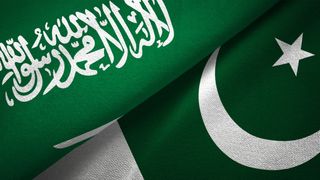On September 17, Saudi Crown Prince Mohammed bin Salman and Pakistani Prime Minister Shehbaz Sharif signed the Strategic Mutual Defense Agreement (SMDA) during the latter’s visit to Riyadh.
“Any aggression against either country shall be considered an act of aggression against both,” the landmark agreement states.
New Delhi’s official response has been measured. It “was aware” of this “development which formalizes a long-standing arrangement between the two countries,” India’s Ministry of External Affairs (MEA) said. When asked about the Pakistani-Saudi pact at the ministry’s weekly media briefing, spokesperson Randhir Jaiswal spoke of India’s expectation that Saudi Arabia “will keep in mind mutual interests and sensitivities.”
When Pakistani media asked Defense Minister Khwaja Asif whether Saudi Arabia would get involved if India and Pakistan went to war, he replied in the affirmative, without mentioning India directly.
Despite Islamabad’s ambitious expectations, it is highly unlikely that Saudi Arabia would involve itself militarily in the event of an India-Pakistan conflict.
Despite Islamabad’s ambitious expectations, it is highly unlikely that Saudi Arabia would involve itself militarily in the event of an India-Pakistan conflict.
Very few details about the pact’s contents have been revealed so far. But placing it in context helps clarify what it provides for — and, more crucially, what it does not.
First, the timing of the agreement, just days after Israel bombed Qatar, is not a mere coincidence. While it may have been in the making for a long time, as Pakistan’s Deputy Prime Minister and Foreign Minister Ishaq Dar alluded to, the signing was definitely accelerated by Israel’s military targeting of Qatar, which has thrown West Asia into turmoil. For the Saudis, the strategic imperative of formalizing a long-standing strategic relationship with an Islamic country was likely aimed at sending a political signal of solidarity to Israel, rather than getting entangled in Islamabad’s long-standing bilateral disputes. This explains why officials in Riyadh have been careful to portray the deal as a natural evolution of long-standing ties.
Second, the history of Saudi engagement with India and Pakistan provides pointers to how Riyadh will likely behave in the future. In recent years, Saudi Arabia has shown some signs indicating a willingness to de-hyphenate India and Pakistan in its South Asia policy, which has allowed it to deepen relations with India, while maintaining its traditional partnership with Pakistan. In the aftermath of the Pahalgam terrorist attacks, Saudi Arabia’s condemnation of terrorism in Jammu and Kashmir stood out as one of the strongest statements from a major Muslim country. Prime Minister Narendra Modi’s visit to Riyadh earlier this year strengthened traditional ties, particularly in energy, and also broadened the partnership to include new areas such as space, defense, and technology.
There is little to suggest that the SMDA would change Saudi positions on any of these issues. In fact, reiterating the need to “balance relations with Pakistan and India,” anonymous Saudi officials told Reuters that Riyadh would continue to grow “robust” ties with India and “contribute to regional peace.”
As it currently stands, the agreement is unlikely to impact the South Asian conflict landscape, and New Delhi will avoid a public rupture with the Saudis at all costs. However, this is not to suggest that the pact is not a cause for strategic alarm in India. At a time when India has been trying to shore up international support vis-à-vis Pakistan on Operation Sindoor following the Pahalgam attack, the Pakistani-Saudi pact leaves New Delhi more isolated. With U.S. President Donald Trump’s recent decision to revoke the sanctions waiver that allowed India to develop Iran’s Chabahar port, the timing of the deal could not have been worse for New Delhi, which now finds itself in an unenviable position.
In the recent past, New Delhi has been able to build closer relations with Israel, while pursuing closer ties with Arab countries. However, as divisions between Israel and the Arab world deepen, India faces insurmountable challenges to maintaining this posture.
India’s clear tilt toward Israel vis-à-vis Palestine in recent years, after decades of championing the Palestinian cause, is complicating its ties with the Arab world. With the Gulf countries increasingly uniting around a more hardline stance toward Israel, New Delhi may have to recalibrate its position. India’s stern condemnation of the Israeli bombing in Doha, in contrast to its muted positions on previous Israeli operations, and recent vote in favor of a U.N. General Assembly resolution endorsing the two-state solution for Palestine, indicate that a shift may be underway.






